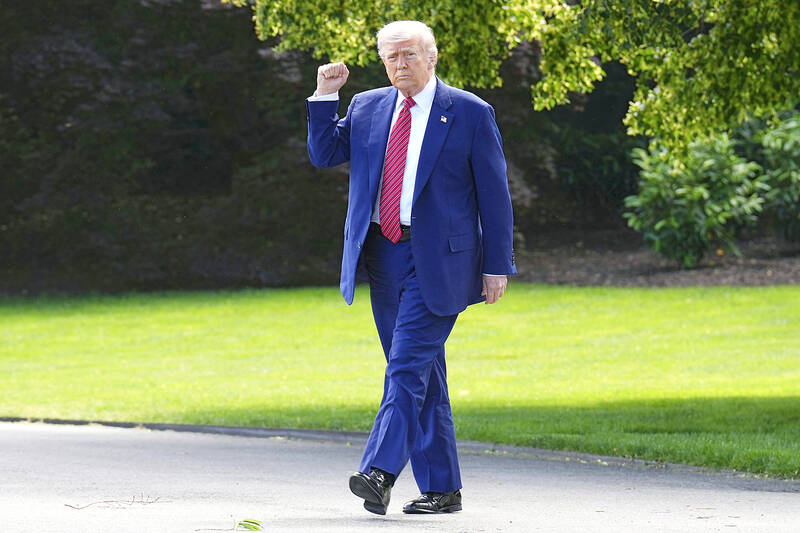A restructuring of the White House National Security Council (NSC) got under way on Friday, as US President Donald Trump moved to slash the size and scope of the once-powerful body, five sources briefed on the matter said.
Staff dealing with a variety of major geopolitical issues, from Ukraine to Kashmir, were sent termination notices in the afternoon, the sources said on condition of anonymity.
The move came just weeks after US Secretary of State Marco Rubio took over from Mike Waltz as national security adviser.

Photo: AP
The NSC declined to comment.
The NSC restructuring is expected to further reduce the agency’s influence, transforming it from a powerful policymaking body into a small organization focused more on implementing the president’s agenda than on shaping it, the sources said.
In practice, the move is expected to grant more authority to the US Department of State, the US Department of Defense and other departments and agencies involved in diplomacy, national security and intelligence matters, the sources said.
The Financial Times (FT) has reported that NSC senior director for Asia Ivan Kanapathy remains in post, but his entire staff, including his China team, has been fired.
It remains unclear whether his deputy, Alex Wong, who is a well-respected official with hawkish views on China, remains in position, it said.
Several high-ranking staffers were fired earlier in the year after right-wing conspiracy theorist Laura Loomer presented Trump with a list of national security staffers she perceived to be disloyal.
The FT said that Loomer, who helped persuade Trump to fire Waltz, had also sought to remove Wong and Kanapathy.
The administration’s aim is to reduce the size of the NSC to just a few dozen people.
Four sources with knowledge of the plans said they expect the final headcount at the NSC to come out to about 50 people.
The NSC is traditionally the main body used by presidents to coordinate national security strategy. Its staff often make key decisions regarding the US’ foreign policy.
The body had more than 300 staffers under former US president Joe Biden, but even before the recent firings under Trump it was well less than half the size of Biden’s NSC.
Additional reporting by staff writer

Taiwan is projected to lose a working-age population of about 6.67 million people in two waves of retirement in the coming years, as the nation confronts accelerating demographic decline and a shortage of younger workers to take their place, the Ministry of the Interior said. Taiwan experienced its largest baby boom between 1958 and 1966, when the population grew by 3.78 million, followed by a second surge of 2.89 million between 1976 and 1982, ministry data showed. In 2023, the first of those baby boom generations — those born in the late 1950s and early 1960s — began to enter retirement, triggering

One of two tropical depressions that formed off Taiwan yesterday morning could turn into a moderate typhoon by the weekend, the Central Weather Administration (CWA) said yesterday. Tropical Depression No. 21 formed at 8am about 1,850km off the southeast coast, CWA forecaster Lee Meng-hsuan (李孟軒) said. The weather system is expected to move northwest as it builds momentum, possibly intensifying this weekend into a typhoon, which would be called Mitag, Lee said. The radius of the storm is expected to reach almost 200km, she said. It is forecast to approach the southeast of Taiwan on Monday next week and pass through the Bashi Channel

NO CHANGE: The TRA makes clear that the US does not consider the status of Taiwan to have been determined by WWII-era documents, a former AIT deputy director said The American Institute in Taiwan’s (AIT) comments that World War-II era documents do not determine Taiwan’s political status accurately conveyed the US’ stance, the US Department of State said. An AIT spokesperson on Saturday said that a Chinese official mischaracterized World War II-era documents as stating that Taiwan was ceded to the China. The remarks from the US’ de facto embassy in Taiwan drew criticism from the Ma Ying-jeou Foundation, whose director said the comments put Taiwan in danger. The Chinese-language United Daily News yesterday reported that a US State Department spokesperson confirmed the AIT’s position. They added that the US would continue to

The number of Chinese spouses applying for dependent residency as well as long-term residency in Taiwan has decreased, the Mainland Affairs Council said yesterday, adding that the reduction of Chinese spouses staying or living in Taiwan is only one facet reflecting the general decrease in the number of people willing to get married in Taiwan. The number of Chinese spouses applying for dependent residency last year was 7,123, down by 2,931, or 29.15 percent, from the previous year. The same census showed that the number of Chinese spouses applying for long-term residency and receiving approval last year stood at 2,973, down 1,520,